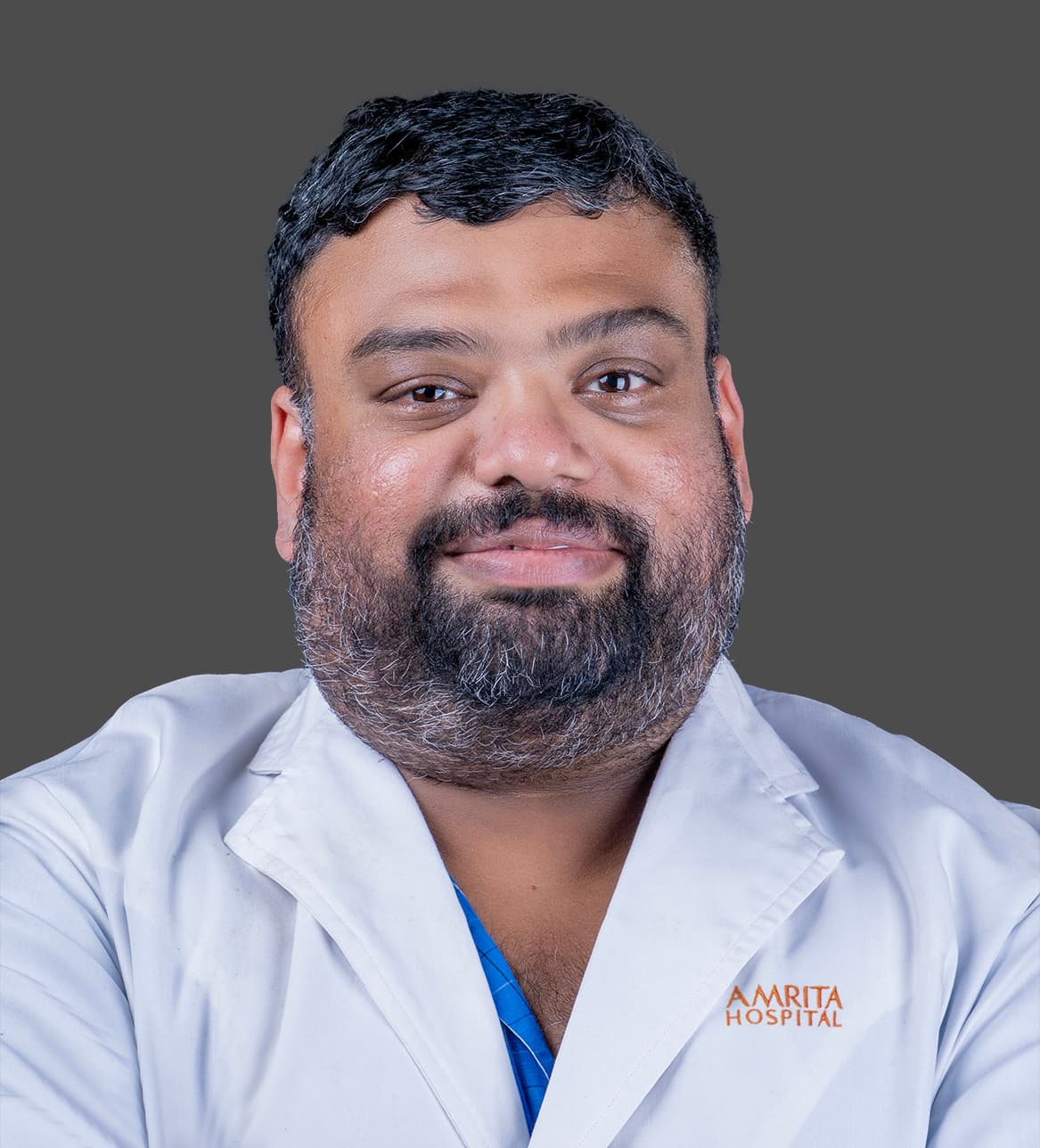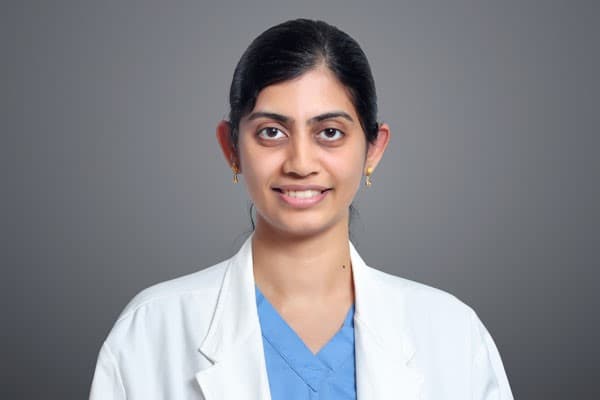Overview
The Cardiac Anesthesia Department at Amrita Hospital specializes in providing comprehensive care for patients undergoing cardiac surgeries and procedures. Our team of highly skilled and experienced cardiac anesthesiologists is dedicated to ensuring the safety and comfort of patients throughout their cardiac interventions.
With a focus on precision and tailored care, they collaborate closely with cardiac surgeons, cardiologists, and other specialists to optimize outcomes for patients with various cardiac conditions.
Specialities
- Adult Cardiac Anaesthesiology
- Paediatric Cardiac Anaesthesiology
Features
- Expertise in anesthetizing patients for a wide range of cardiac surgeries and procedures, including coronary artery bypass grafting (CABG), valve repair/replacement, congenital heart surgeries, and transcatheter interventions.
- Customized anesthetic plans tailored to each patient's unique cardiac anatomy, physiology, and comorbidities.
- Utilization of advanced monitoring techniques and equipment specifically designed for cardiac anesthesia, ensuring precise hemodynamic management and patient safety.
- Integration of multimodal pain management strategies to enhance postoperative recovery and minimize discomfort.
- Seamless coordination with the cardiac surgery team to optimize perioperative care and outcomes for patients undergoing complex cardiac procedures.
Why choose us?
Our motto is care with compassion. Our goal is to provide high quality, empathetic, comprehensive and economical perioperative services for our patients. We have state of the art facilities and equipment to ensure complete patient safety peri-operatively. We provide round the clock in-house services of a trained post-doctoral cardiac anesthesiologist in postoperative cardiac intensive care units to ensure high quality care for our patients 24 x 7, which is a unique feature of our unit.
Our results are at par with world’s best cardiac centres. We update and upgrade our standards in accordance with world-par literature. We strive to provide our patients and their family a stress-free, safe surgical and intensive care experience. Our multidisciplinary cardiac rehabilitation programme ensures providing a good quality of life to our patients after hospital stay. Our research activities focus on continued improvement of the quality of care provided and patient quality of life after cardiac surgery.
What we offer?
As peri-operative physicians, we provide counselling of patients and their families, pre-operative optimisation, intraoperative management and post operative care to adult, paediatric and neonatal patients undergoing cardiac and thoracic surgeries.
Services
Adult cardiac services:
- Perioperative care to patients undergoing open heart, aortic, and thoracic surgeries (both elective and emergency)
- Anaesthesia and imaging support for ECMO, LVAD, and cardiac transplants
- Anaesthesia for cardiac catheterization lab procedures like EP studies, pacemaker insertion, and primary PCIs
- Anaesthesia for cardiac interventional procedures like TAVI, TEVAR, EVAR
- Anesthetic management of complex interventional pulmonology procedures.
- On-call services to adult and paediatric cardiac intermediate care ICUs and neonatal ICU.
- Consultation for ventilatory management, regional anesthesia and analgesia services, percutaneous tracheostomy procedures and emergency support during respiratory and cardiac arrest situations in cardiac ward and intensive care units.
- In-house round the clock services of a post doctorate cardiac anaesthesiologist in adult cardiac surgical intensive care unit.
Paediatric and neonatal services:
- Anaesthesia and perioperative management for Paediatric and neonatal cardiac surgeries (both elective and emergency)
- Neonatal and Paediatric airway emergencies
- 24*7 Neonatal and Paediatric cardiac intensive care by an in-house post-doctoral cardiac anaesthesiologist
- Advanced ultrasound guided Neonatal and paediatric vascular access
- Ultrasound guided Neonatal and paediatric regional analgesia
- Anaesthesia for interventional catheterization procedures in patients with complex congenital heart diseases
- Anaesthesia for Paediatric cardiac CT and MRI
- Anaesthesia for Paediatric and neonatal ECMO
- Anaesthesia for Paediatric cardiac transplants
- Anaesthesia for paediatric interventional pulmonology
- Advanced pediatric ventilation strategies such as HFOV
- Paediatric and neonatal ECMO
Academics
Facilities
- Advanced hemodynamic monitoring including continuous cardiac output monitoring in post operative period.
- State of the art echocardiography machines,
- Adult 3D transesophageal echocardiography probes, pediatric 2D TEE probes.
- Flexible fibreoptic adult and paediatric bronchoscopes
- Lung isolation devices
- ECMO- elective and emergency
- IABP
- NIV, latest model ventilators, High-flow nasal cannula, HFOV
- Advanced difficult airway equipments, video laryngoscope
Fellowship Programmes/Trainings
We have a NMC recognised post doctorate programme in Cardiac Anaesthesia from the year 2012 which trains 2 anaesthesiologists every year. Our goal is to train the residents in the intricacies of cardiac preoperative evaluation, invasive monitoring, hemodynamic optimization, transthoracic and transoesophageal echocardiography, management of cardiopulmonary bypass and postoperative cardiac intensive care. We aim to generate doctors with competence and compassion.
- Post Doctoral Certificate Course [PDCC]
Duration: 1 year
Eligibility: MD/DNB in Anaesthesiology - FIACTA fellowship
Duration: 2 years
Eligibility: MD/DNB in Anaesthesiology
FAQs
An anaesthesiologist is known as the perioperative physician who prepares the patient to ensure he or she can undergo the surgical procedure safely and comfortably. A cardiac anaesthesiologist also assists the surgeon in perioperative decision making with transesophageal echocardiography guidance. The cardiac anaesthesiologist tailors and prepares a perioperative management for the patients to have a painless, safe and pleasant experience of surgery and post operative care.
Anesthesia is provided using intravenous medications, supplemented with inhalational agents. It is titrated and delivered to render a patient unconscious. Components of balanced anaesthesia includes anxiolysis, amnesia, absolute pain relief and immobilisation of the patient during surgery. All open heart surgeries in our centre in done under general anaesthesia (GA). Regional blocks are given as part of multimodal pain management regime.
Anesthesia risk is based on the co-morbidities of the patient, their cardiac pathology and the surgical procedure planned. Anesthesia itself produces a risk of 0.03 % for morbidity and mortality irrespective of any of the above mentioned factors. A cardiac anaesthetist will screen patients preoperatively to optimise their co-morbidities that can adversely affect their outcomes. The anaesthesia technique is planned to allow safe conduct of surgery ensuring patient comfort and safety. Patients will be counselled regarding the mode of anaesthesia, surgical steps and the possible impact it can have on the postoperative outcome.
Anesthesia care is presently conducted using short and ultra-short acting drugs and high end monitoring techniques. This allows the patient to be weaned off anesthesia within a span of 10-15 minutes with some variations possible based on the duration of surgery. To ensure a smooth awakening of the patients and to allow adequate optimisation postoperatively patients are continued on sedation once anesthetics are discontinued. This may be continued based on the discretion of the anaesthetist in the postoperative care unit.
Role of an anaesthetist spans from the time a patient is scheduled for surgery till the patient leaves the intensive care unit after surgery. A consultant anaesthesiologist stays in-house with patients for hemodymamics, invasive ventilation and pain management. A cardiac anaesthesiologist provides cardiac intensive care and aids in prompt detection and management of immediate post-surgical complications. The duty cardiac anaesthetist is also available to bystanders for communication about the patient’s status at all times.












